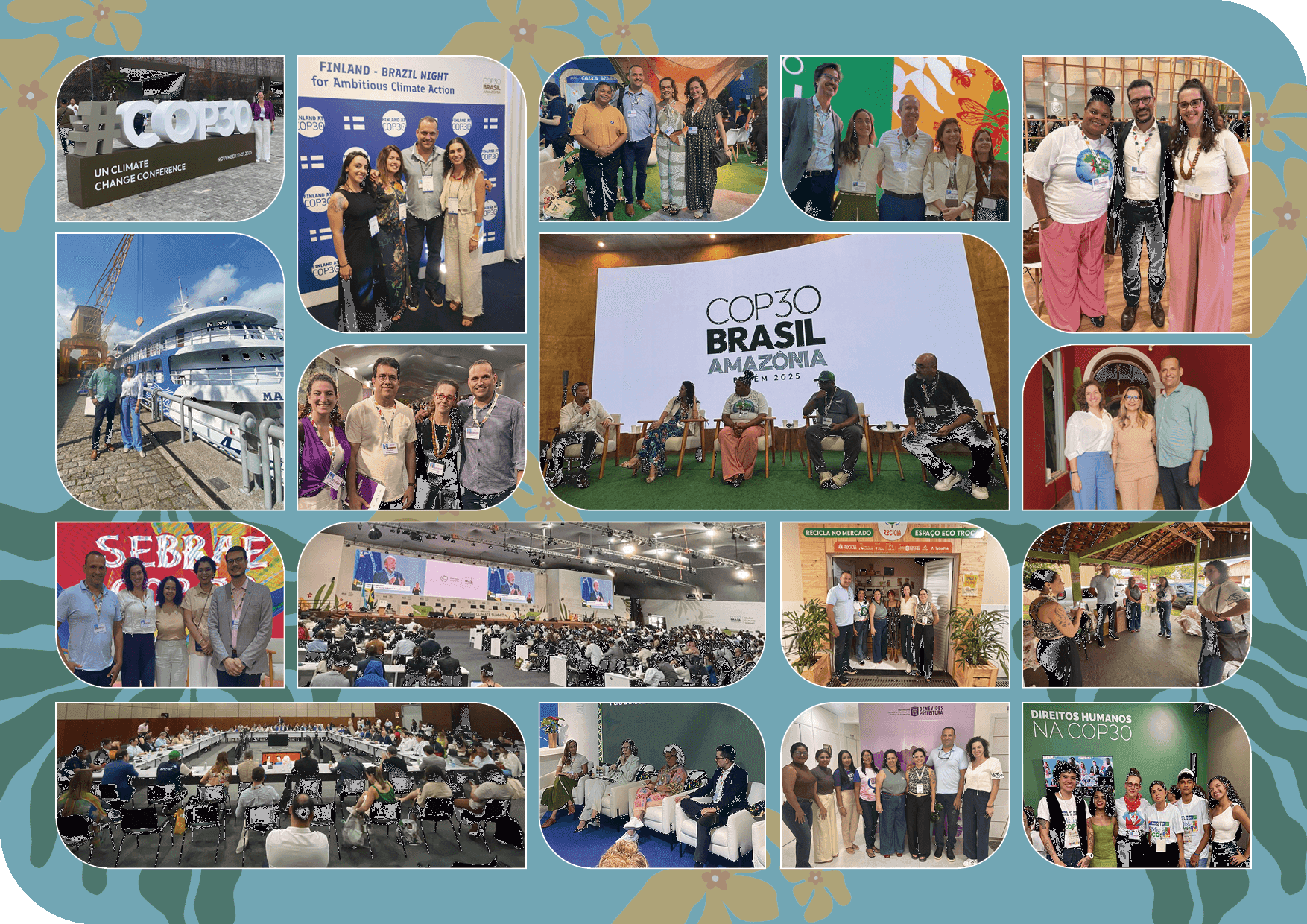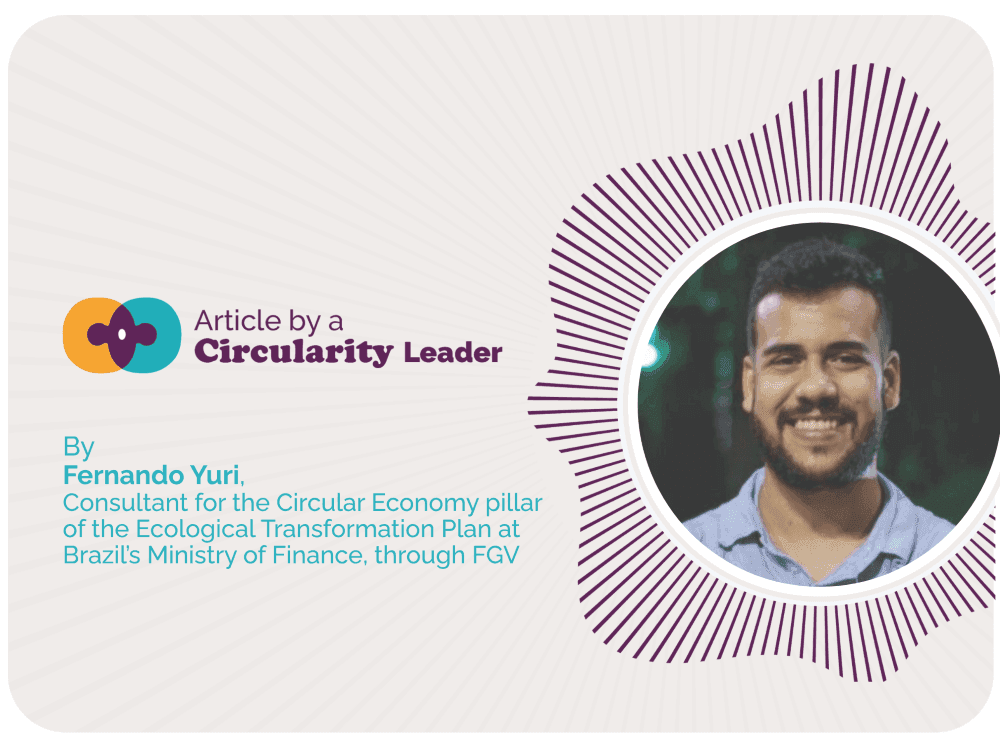
25/11/2025
Circular Movement participates in COP30 and strengthens the Circular Economy agenda in Brazil
By Arlene Carvalho, from Circular Movement
Held for the first time in Brazil, COP30 transformed Belém-PA into a true laboratory for climate transition, where global commitments met concrete implementation plans and where the Circular Economy, for the first time in 30 editions, gained official space on the agenda. In this context, Circular Movement marked its presence in the Blue Zone and promoted the “In Movement at COP30” coverage, following high-level negotiations and on-the-ground experiences, precisely in the Year of the Circular Economy, when the initiative celebrates five years of action.
Throughout the conference, COP30 maintained a clear guiding thread: turning promises into action. Discussions advanced on topics such as adaptation, energy transition, technology, and the Circular Economy, highlighting the importance of cities and local governments in implementation, as well as the role of companies and individuals in the transition, with a focus on jobs, health, and capacity building. Energy, industry, and finance also gained attention, with debates on fuels of the future, low-impact buildings, and mechanisms to unlock climate investments. In the final moments, nature returned to the center of solutions, reinforcing the relevance of forests, oceans, biodiversity, and the leadership of Indigenous peoples and traditional communities in constructing effective responses to the climate crisis.
Despite the symbolism of hosting the conference in the Amazon and important progress on adaptation, just transition, and guaranteeing rights for Indigenous peoples, COP30 ended without delivering what many expected: a clear pathway toward phasing out fossil fuels and conserving forests. Negotiations were marked by deadlocks and political pressure, showing that there is still a gap between the urgency of the climate crisis and the pace of global decision-making. Even so, the meeting left relevant signals, such as greater focus on implementation in the territory, increased demand for financing, and a growing understanding that nature-based solutions and models like the Circular Economy must be at the center of responses to the climate emergency.
Vinicius Saraceni and Marina Amorim, general director and portfolio manager of Circular Movement, respectively; Marina Serpa, associate consultant at YBY Dinâmicas; and Aline Sousa, representative of the National Movement of Recyclable Material Collectors of the Federal District (MNCR DF), formed the team that experienced COP30 from the inside and shared this journey in real time on our social media.
Circular Movement returns with an expanded repertoire, valuable connections, and accounts that arrive directly from Belém, revealing what happens when negotiations come to life on the ground. These impressions, behind-the-scenes moments, encounters, and perspectives help translate COP beyond speeches — and you can read them below:

“Being at COP30 in the heart of the Amazon was an experience that goes far beyond the event itself. Belém revealed, on every corner, both the contradictions and the power of a territory that already lives, every day, the challenges of transitioning toward circularity. From the very first days, it became evident how strongly the Amazonian bioeconomy pulses — whether in the tons of açaí arriving at Ver-o-Peso or in conversations with those who depend directly on the forest to exist. It is an enormous potential that needs to be incorporated more strategically and with greater prominence into circularity policies. Seeing the first green hydrogen–powered boat docked next to the traditional açaí boats perfectly captured this year’s COP: innovation and tradition sharing the same river, with a striking proximity between the future and the present. But nothing impacted me as deeply as our visit to Benevides, where a recycling policy transformed the city in less than 18 months. Walking through streets free of plastic waste and hearing about the crucial role of community mobilization is to clearly witness that structural change is possible — and can happen quickly when knowledge and engagement come together. Being in Belém also meant reconnecting with people, strengthening relationships, and creating new connections that only a space like this can provide. These were intense days, marked by exchange, learning, and a heat — whether human or Amazonian — that followed us everywhere. I return with the feeling that experiencing COP in the Amazon means being deeply shaped by the complexity and strength of this territory. And when we see Circular Economy gaining real space, inside and outside negotiation rooms, it becomes impossible not to renew the hope that we are moving in the right direction!”

“Participating in COP30 was a rich, symbolic, and powerful experience. It wasn’t just about being at a global event — it was witnessing history unfold in my country, in the North, in a Belém that radiates culture, resistance, and the urgency of caring for what sustains us. Seeing circular economy included as one of the official themes of the COP for the first time was remarkable. For those who work every day to ensure this agenda gains centrality, it was emotional to see such a concrete milestone. But what makes COP unique is the convergence of so many voices, knowledge systems, and diverse issues, all mobilized around a larger goal: building dignified and sustainable living conditions for us and future generations. It is simultaneously a space of tension and hope, where the future is contested with depth, diversity, and intensity. And Belém made this experience even more special. Watching international leaders cope with the Amazon heat and connect with the strength of this territory was deeply symbolic. Experiencing this in a country that allows so many expressions and agendas to coexist freely adds even more meaning. Now, we need to move toward actual implementation. We know the path is challenging, but we remain committed to collective construction. COP renews a feeling of hope. Let us continue to be ‘hopeful realists’ and keep moving forward.”

“Being part of COP30 meant feeling the contrast between the air-conditioned negotiation halls and the humid heat that permeated every area of Belém. The Amazonian city showed that it is not a backdrop — it is a protagonist; and that Circular Economy is already alive there, whether in the forest bioeconomy, in local production chains, or in the reuse of knowledge, food, and materials. Officially included for the first time at a COP, circularity established itself as a concrete means of implementing resilience and solutions suited to vulnerable territories. Between pavilions and streets, it became clear that a just transition requires multiple voices: women, waste pickers, youth, traditional peoples, educators — strengthened by actions such as the Climate March and the People’s Banquet organized by the People’s Summit. I return with the certainty that our strength lies in diversity. Now, the challenge is to turn agreements into practice on the ground, with responsibility from public bodies and real participation from those on the frontlines of the crisis. Urgency does not allow postponement.”

“My experience at the COP was extremely positive. It was 12 intense days filled with exchange, learning, and participation in panels—both contributing and attending. I made important connections, reunited with dear colleagues, and became even more involved with the waste-picker groups, strengthening bridges and engagement. I was very pleased to see Zero Waste experiences and environmental protection actions, such as those on Kombu Island, which greatly enrich our knowledge. We returned with a wealth of insights and consolidated partnerships. We also encountered transformative initiatives, such as solutions that convert non-recyclable plastics into urban furniture or eco-friendly bricks. The Brazilian Agency for Industrial Development (ABDI) presented the expansion of the Recircula Brasil platform, which now advances in tracking recycled materials such as aluminum, glass, paper, and textiles, further strengthening the commitment to solid data and traceability. The waste-pickers’ panel, in the final days, was an essential space for debate, where different groups were able to express concerns, conflicts, and perspectives. There, we reinforced that the legacy of the COP belongs to them - a legacy for Brazil - and that all that investment is only the beginning of what they can still achieve. I am grateful for everything and for the wonderful people who walked alongside us on this journey.”

